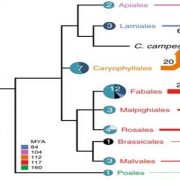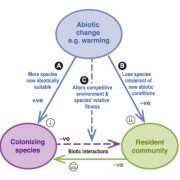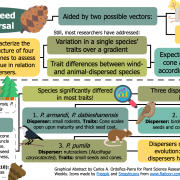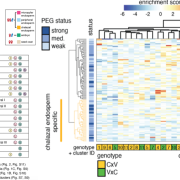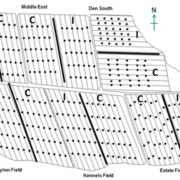Influential neighbours: Seeds of dominant species affect the germination of common grassland species (J. Veg. Sci.)
 Seed-seed interactions can control the germination of grassland species. The result of this interaction (i.e., germination being inhibited or promoted) presumably depends on the dominance and taxonomic relatedness of interacting species. However, the relative importance of these factors is poorly explored. Here, Fenesi et al. assessed the interactions between seeds of nine perennial species from a semi-dry grassland, focusing on the effect of dominant and subordinate species on the germination of three Asteraceae target plants. The authors incubated seeds of the target species with varying densities of a neighboring species seeds. They also tested the effect of water availability on these interactions. Regardless of taxonomic relatedness, growing along dominant species’ seeds had a mixed impact on the germination of target species, being positive, negative, or null depending on the target species. Also, the density of neighboring seeds and water availability changed magnitude the direction of the effect, being positive in most high-density treatments and negative in low-density ones. Given these results, the authors highlight the complexity of seed-seed interactions. Still, they support that the relative dominance of a species in an ecosystem has a more substantial influence on these than taxonomic relatedness of interacting species. (Summary by Carlos A. Ordóñez-Parra @caordonezparra) J. Veg. Sci. 10.1111/jvs.12892
Seed-seed interactions can control the germination of grassland species. The result of this interaction (i.e., germination being inhibited or promoted) presumably depends on the dominance and taxonomic relatedness of interacting species. However, the relative importance of these factors is poorly explored. Here, Fenesi et al. assessed the interactions between seeds of nine perennial species from a semi-dry grassland, focusing on the effect of dominant and subordinate species on the germination of three Asteraceae target plants. The authors incubated seeds of the target species with varying densities of a neighboring species seeds. They also tested the effect of water availability on these interactions. Regardless of taxonomic relatedness, growing along dominant species’ seeds had a mixed impact on the germination of target species, being positive, negative, or null depending on the target species. Also, the density of neighboring seeds and water availability changed magnitude the direction of the effect, being positive in most high-density treatments and negative in low-density ones. Given these results, the authors highlight the complexity of seed-seed interactions. Still, they support that the relative dominance of a species in an ecosystem has a more substantial influence on these than taxonomic relatedness of interacting species. (Summary by Carlos A. Ordóñez-Parra @caordonezparra) J. Veg. Sci. 10.1111/jvs.12892


